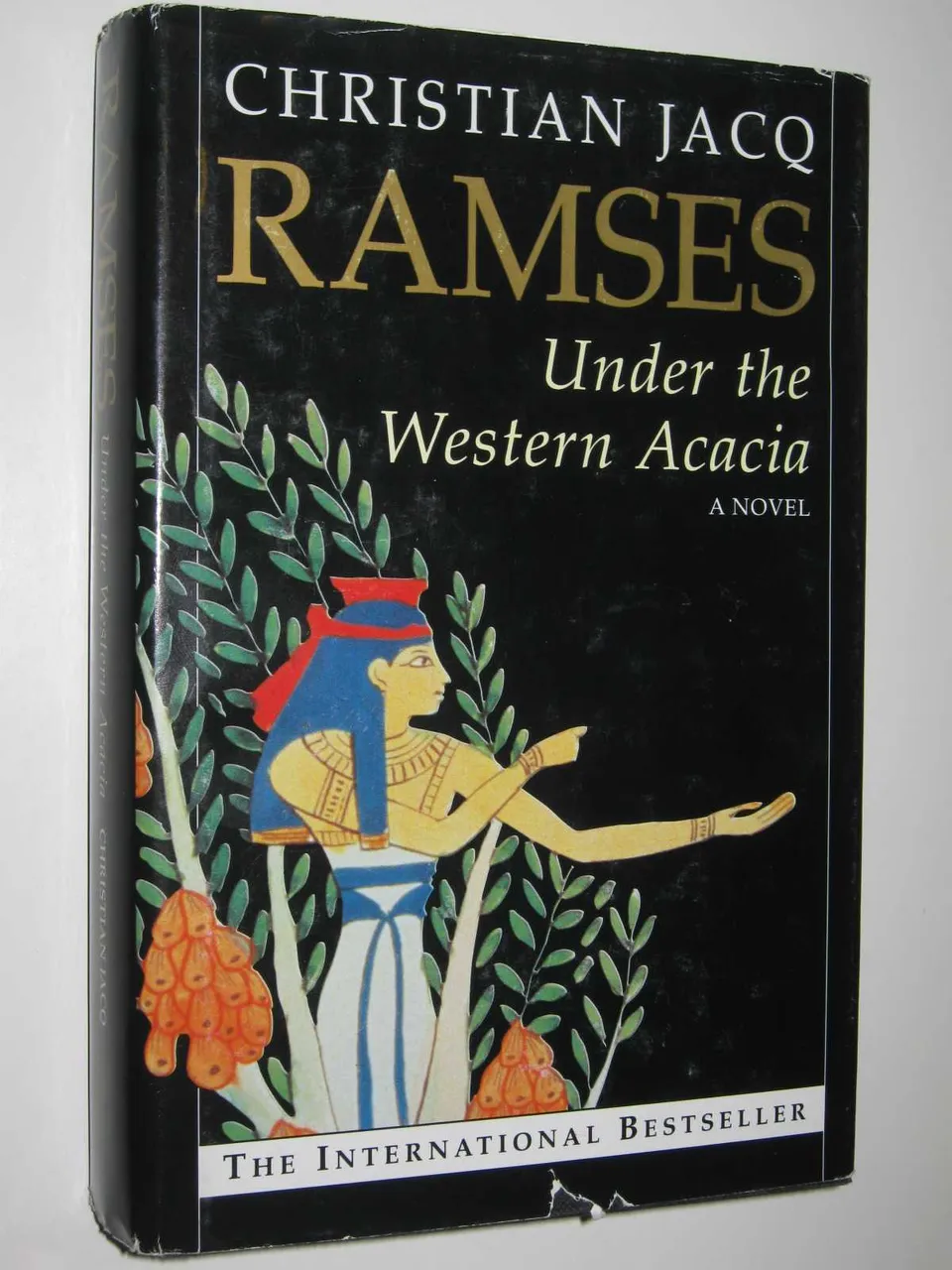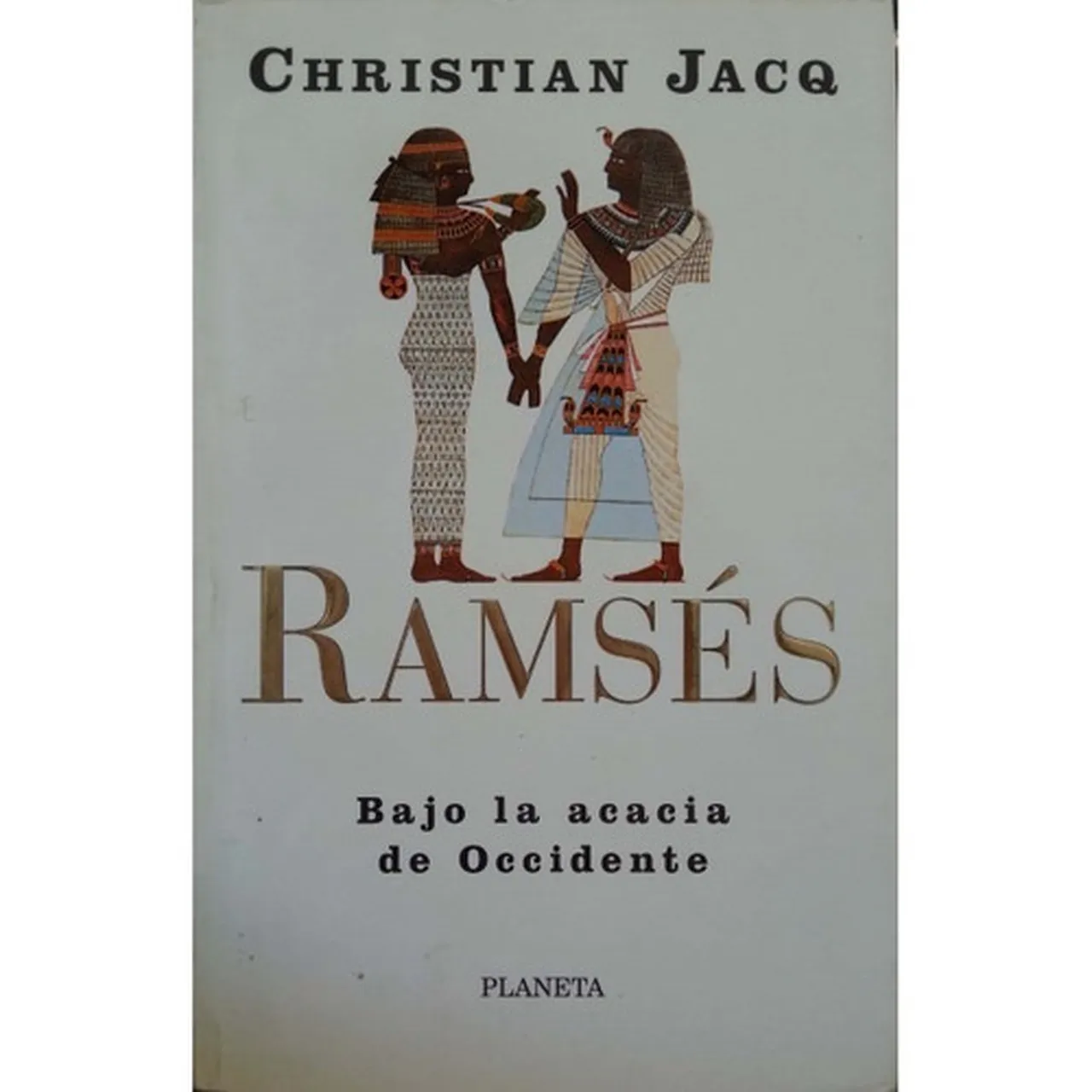
The Last Enemy, translated in some Spanish-speaking countries also with the name Under the Western Acacia to literally follow the translation of the original (Sous l'acacia d'Occident) is the last volume that the French writer and Egyptologist Christian Jac dedicates to the saga of the most famous of all pharaohs, Ramses II, who has passed to posterity simplifying his name as Ramses, although there were several sovereignties of this dynasty.
This pentalogy begins with The Son of Light, with a very young Ramses, entering adolescence and facing a wild bull as a sign of the end of his childhood.
From that moment on, a story full of emotions, loves, betrayals and righteousness in his eagerness to rule and unite a country -Egypt- for almost seventy years, setting an absolute record of prosperity, welfare and development of the arts and sciences in the main power of the world in the 12th century BC.

El Ultimo Enemigo, traducido en algunos países hispanos también con el nombre Bajo la Acacia de Occidente para seguir literalmente la traducción del original (Sous l'acacia d'Occident) es el último volumen que el escritor francés y egiptólogo Christian Jac le dedica a la saga del más famoso de todos los faraones, Ramsés II, que ha pasado a la posteridad simplificando su nombre como Ramses, a pesar de que fueron varios los soberanías de esta dinastía.
Esta pentalogía se inicia con El Hijo de La Luz, con un Ramses muy joven, entrando en la adolescencia y afrontando un toro salvaje como señal del fin de su niñez.
A partir de ese momento una historia constelada de emociones, amores, traiciones y la rectitud en su afán de gobernar y unir un país -Egipto- durante casi setenta años marcando un récord absoluto de prosperidad, bienestar y desarrollo de las artes y las ciencias en la principal potencia del mundo en el siglo XII a.C.


In this last book of the saga we find a Ramses with fifty years, in the cuúl the weight of the years is felt and a continuous infection in the teeth forces him to a continuous medical treatment.
Uri-Teshup the son of Muwatali the Hittite king, has asked for asylum in Egypt, fearing to be assassinated by his uncle Hattusil who has taken the throne of Hatti, in the middle of the Anatolian plateau.
To establish a definitive peace Asha, in his continuous pilgrimage, between Egypt and Hatti transmits to the pharaoh the concerns of the new Hittite monarch Hattusil: tired of feeling a subject of Egypt wants to become part of the kingdom demanding that Ramses marries his daughter.
To do this he should repudiate Iset who covers the position of royal wife that has become vacant after the death of Nefertari.
To avoid that the pharaoh is forced to choose between the Hittite blackmail or war decides to commit suicide to free the way. In this way he allows the pharaoh to marry the Hittite princess.
However the internal and external plot to force Ramses to abdicate continues.
Uri Teshup allies himself with a Syrian raia merchantman and the complicity of the new queen.
On the return trip after the celebration of the marriage and with the peace consolidated, the caravan in which Asha travels is assaulted by followers of the plotters and Uri Teshu himself assassinates Ramses' friend and chancellor. All with the aim of provoking a new war and dethrone Ramses.
Ramses learns of the complicity of his Hittite wife in the plot and, disgusted, reproaches her for her attitude and confines her in the harem of Merur, leaving her to live in that golden cage.
The betrayals multiply, hatred grows and the conspirators come out into the sunlight.
Ramses at the head of his army confronts the Lybian tribes that have made a coalition commanded by Malfi the brother of Ophir and in the encounter Serramanna at the cost of her life manages to eliminate Uri Teshup who was preparing to kill Ramses.
In the midst of all these intrigues Hattusil is received in Egypt, and on that occasion he has the real opportunity to see what peace between the two peoples means. The Egyptians and Hittites truly fraternize, and cease to be enemies.
Of their initial friends Asha is dead, Moses has taken another path, while Setau and Lotus have become governors of Nubia.
Only Ameni, his faithful friend and private secretary, has remained by his side. Cazador, his lion friend and companion of so many battles, and Guardian, his dog that has generated new litters of descendants, have also died.
Tired of long exploits, he sees his end and sitting under the centennial acacia, the great Ramses dies in the company of Ameni, who begins to write the story that will immortalize him through time.

En este último libro de la saga encontramos a un Ramsés con cincuenta años, en el cuúl el peso de los años se hace sentir y una continua infección en los dientes lo obliga a un continuo tratamiento médico.
Uri-Teshup el hijo de Muwatali el rey hitita, ha pedido asilo en Eqipto, temiendo ser asesinado por su tio Hattusil que se ha quedado con el trono del Hatti, en pleno altiplano de Anatolia.
Para establecer una paz definitiva Asha, en su continuo peregrinar, entre Egipto y Hatti le trasnmite al faraón las inquietudes del nuevo monarca hitita Hattusil: cansado de sentirse un súbdito de Egipto desea pasar a ser parte del reino exigiendo que Ramses se case con su hija.
Para ello debería repudiar a Iset que recubre el cargo de esposa real que ha quedado vacante después de la muerte de Nefertari.
Para evitar que el faraón sea obligado a elegir entre el chantaje hitita o la guerra decide suicidarse para lòiberar al camino. De esta manera permite que el faraón se case con la princesa hitita.
Sin embargo el complot interno y externo para obligar a Ramses a abdicar continúa.
Uri Teshup se alia con un mercante sirio raia y la complicidad de la nueva reina.
En el viaje de regreso luego de la celebración del matrimonio y con la paz consolidada, la caravana en la que viaje Asha es asaltada por seguidores de los complotados y Uri Teshu en persona asesina al amigo y canciller de Ramses. Todo con el objetivo de provocar una nueva guerra y destronar a Ramsés.
Ramsés, se entera de la complicidad de su esposa hitita en el complot y disgustado le reprocha su actitud y la confina en el harén de Merur, dejándola vivir en esa jaula de oro.
Las traiciones se multiplican, el odio crece y los conjurados salen a la luz del sol.
Ramsés al frente de su ejército enfrenta a las tribus líbicas que han hecho una coalición comandada por Malfi el hermno de Ophir y en el encuentro Serramanna a costa de su vida lograta eliminar a Uri Teshup que se aprestaba a matar a Ramsés.
En medio de todas estas intrigas Hattusil es recibido en Egipto, y en esa ocasión tiene la verdadera oportunidad de ver lo que significa la paz entre ambos pueblos. Los egipcios e hititas fraternizan de verdad, y dejan de ser enemigos.
De sus amigos iniciales Asha está muerto, Moisés ha tomado otro camino, mientras Setau y Loto se han transformado en gobernadores de Nubia.
Solo Ameni su fiel amigo y secretario particular ha quedado a su lado. También han muerto Cazador, su león amigo y compañero de tantas batallas, y Guardián, su perro que ha generado nuevas camadas de descendientes.
Cansado de las largas hazañas, ve llegar su final y sentado bajo la acacia centenaria, el gran Ramsés muere en compañía de Ameni, quien comienza a escribir la historia que deberá inmortalizarlo a través del tiempo.

This concludes an entertaining and instructive saga in which Christian Jacq has managed to combine in a historical and fictional story, over five books, the whole life of the most important pharaoh of that magical and mysterious world that was Ancient Egypt.
A millenary culture that has not been transmitted to future generations in its just measure.
An empire in which peace was privileged over war and which had no expansionist ambitions, where although the pharaohs were worshipped in a manner similar to the gods, they did not cease to favor the development of the arts, literature and science.
And of which there are still numerous testimonies today.

Se concluye de esta manera un saga entretenida e instructiva en la cuál Christian Jacq ha sabido combinar en un relato histórico y de ficción, a los largo de cinco libros, toda la vida del faraón más importante de ese mundo mágico y misterioso que fue el Antiguo Egipto.
Una cultura milenaria que no ha sido transmitida a las futuras generaciones en su justa medida.
Un imperio en el que se privilegiaba la paz a la guerra y que no tenía ambiciones expansionísticas, donde si bien a los faraones se les rendía un culto similar a los dioses, no por eso dejaban de favorecer el desarrollo de las artes, de la literatura y de las ciencias.
Y del cuál hoy todavía quedan numerosos testimonios.
Translated with/Traducido con DeepL Translator.

